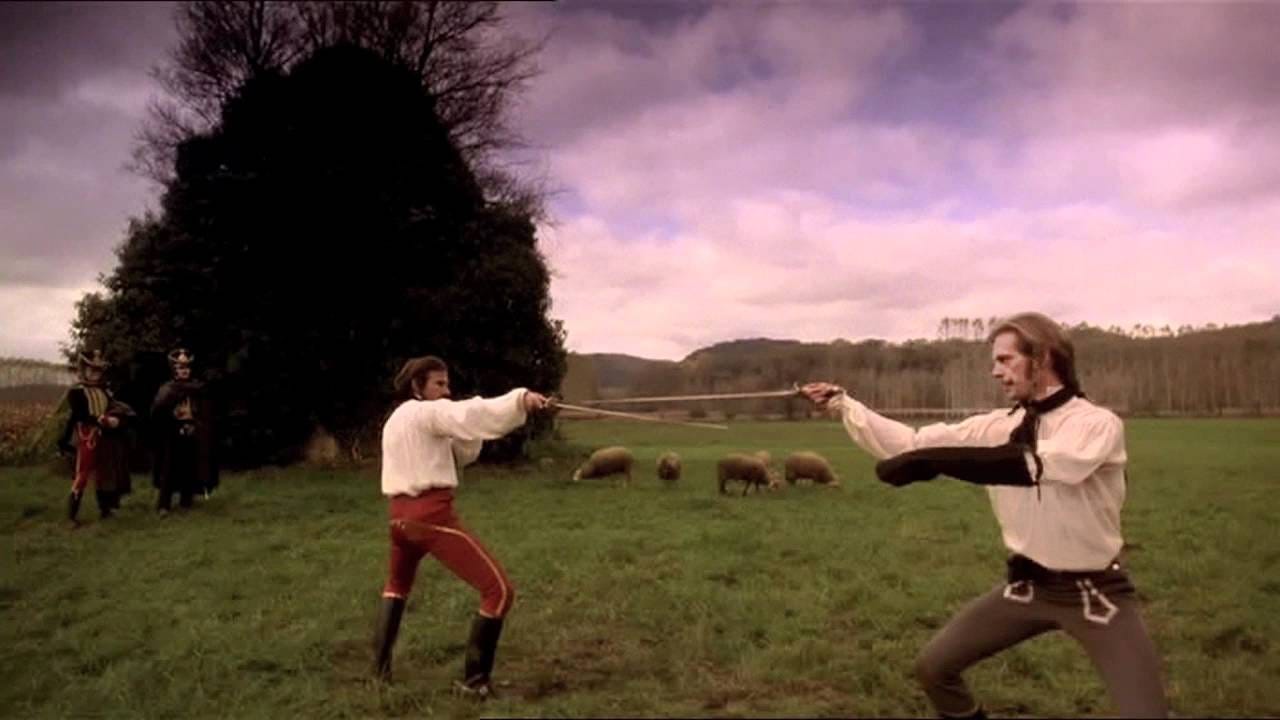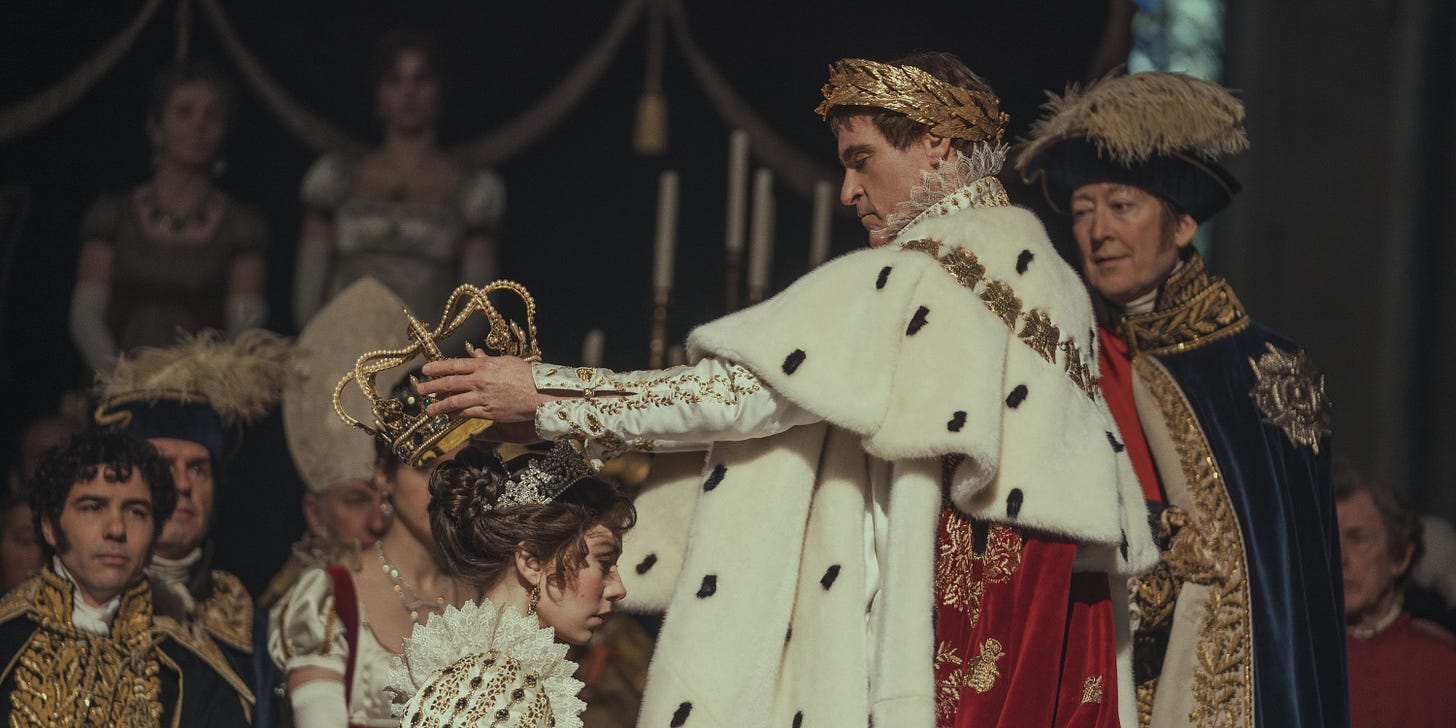Napoleon Review
Ridley Scott's latest epic is boring, historically illiterate, and utterly without any semblance of plot.
Napoleon (2023) begins on the note that will define the rest of the film. In a strange and overly confined arena, uncrowded by an apathetic mob, an unconvincing actress stumbles toward a guillotine in a crude and gratuitous reenactment of Marie Antoinette’s famous execution. When the blade falls, the camera does not cut away; we witness every gory detail—animated digitally, of course—as her head falls from her body and blood sprays in all directions. An executioner holds her head aloft. “Long live the Republic!” we hear him cry, or something to that effect. As we wonder what the purpose, the significance, of this moment is to the plot as a whole, the camera withdraws, and there we see in the audience our leading man: Napoleon himself, played by Joaquin Phoenix at age 50.
Several things stand out:
Napoleon was not at Marie Antoinette’s execution. He was at Toulon. This scene is historically erroneous.
As a character, Marie Antoinette is barely introduced and immediately done away with. Her relevance to the story of Napoleon and Josephine is not clear. Taken holistically, this scene adds nothing.
Her performance is as convincing as a high school play, and the extras around her seem disinterested and sedated. The location does not make sense. The scale is much too small. This scene is not convincing.
The year is supposedly 1794. For some reason, Napoleon is a 50-year-old man. This makes the scene comical.
These same four problems will plague the rest of the film. A disinterest in historical accuracy; a lack of exposition or story structure; nonsensical characterization and unconvincing acting; and the horrible miscasting of the leading man.
I love Napoleonic history. Sergei Bondarchuk’s Waterloo (1970) is my favorite film, ever. I have watched it dozens of times.
I do not love Ridley Scott. He is pretentious and geriatric, and Alien (1979) is his only truly good movie. But The Last Duel (2021) was a surprisingly decent historical drama, and I had some hope that Scott might have been able to pull it off again with my favorite historical character. Perhaps, in the twilight of his career, in his 80s, he had pulled himself together.
My hope lasted about fifteen seconds into the film. Napoleon is a badly written, badly acted, and very badly directed blunder of an attempt at a historical epic. It is bereft of plot and does not compensate with character or spectacle. As a work of visual art, it is lacking in every respect: dull, ugly, and confusingly shot in every scene. As a piece of entertainment, it is good only for sedation.
I do not recommend it.
Some Elucidation
Ridley Scott’s first feature film was The Duelists (1977), a historical epic about two cavalrymen in Napoleon’s army who fight a series of duels over the course of the Napoleonic Wars.
The Duelists is not a good movie. It demonstrates all of Scott’s characteristic disinterest in people and storytelling, and is mostly just boring. But it is beautifully shot, with fantastic set pieces and glorious fight sequences. In terms of raw aesthetics, there are few films that could be considered its superior. There is a reason why it launched a 50-year directorial career.
Napoleon is not beautifully shot. It is very ugly. The CGI stands out constantly, and everywhere it’s obvious where actors are digital. The scale of the battles is never large enough, likely because animators sitting behind screens have no idea what 60,000 men engaged in combat actually look like. They never capture the enormity of scale required by the setting. While the dialogue sequences are clear and visible, whenever a battle comes around, a dull gray-blue filter falls over the lens, which makes it impossible to distinguish between uniform colors or get a clear sense of what is happening. It’s applied without any sense for the scenes at hand: day or night, light or dark, down comes the filter.
It might be just as well. If we could see the battle sequences clearly, we would be better able to tell how absurd and poorly reenacted they are.
I did not expect much from Scott in this regard. But I had expected some bare minimum of care for basic historic details. For example, the French—very famously—fought battles in columns rather than lines. This defined their tactics in the Napoleonic period.
In Napoleon, the French fight in lines. Exactly as the British do.
At the Battle of Waterloo, trenches were not dug in pitched battles and lines did not utilize fire-by-rank tactics.
In Napoleon, the British dig trenches and use fire-by-rank tactics at Waterloo.
Historically, Talleyrand retired as Napoleon’s foreign minister in 1807.
In Napoleon, Talleyrand is the one who demands Napoleon abdicates in 1815.
Napoleon Bonaparte did not shoot cannons at the pyramids of Gaza.
In Napoleon, Napoleon shoots cannons at the pyramids of Gaza.
Et cetera. The details of the battles themselves are recreated in only the broadest of strokes; here, Napoleon finishes Waterloo by personally leading a cavalry charge and slaying no fewer than two enemies with his own saber. Quite an impressive feat for a man enduring terrible GI pain, who was also, at the time, out of his mind on opium, and was an artillery captain—not a knight.
These inaccuracies could maybe be forgiven if made in the pursuit of some kind of poignant message, or to create a leaner and cleaner dramatic narrative. But there is no leanness or cleanness to Napoleon’s narrative. There may not even be narrative at all. The film suffers immensely from the inevitability that 21 years of complex political and military history cannot be condensed into a single 158-minute long film. The Battle of Waterloo alone takes more than two hours to tell in its entirety, if one is concerned with making it visually and dramatically engaging.
Ridley Scott had no such concerns. We skip from one scene to the next with no logic whatsoever. The core of the story around all which revolves is Napoleon’s romantic relationship with Josephine, but in no actual practical way has this been created through screenwriting. If this is a story about how a great man was created by a great woman, then the battle sequences are totally gratuitous: like Marie Antoinette’s execution, they have been included only for name recognition. The story should have focused solely on Napoleon and Josephine’s relationship and forgotten about irrelevant details, no matter how historically famous. The climax should have been Josephine’s death during the 100 Days.
Napoleon no longer has his driving force. He knows a battle is coming, and he knows that without Josephine, he will not be able to win it. His career as a general is over. The rest is history.
CUT TO CREDITS.
That could have worked, maybe. But it’s not what Scott does. In fact Josephine’s death is barely the start of the third act, and it passes like a drop of blood in an iced-over lake. We still have to endure all of the Waterloo Campaign, despite the fact that the story has no through-line and no plot whatsoever to speak of without Josephine. It doesn’t have one with her either, mind you, but there’s literally nothing after she’s dead. Napoleon after this point is the cinematic equivalent of a putrescent zombie shambling down the street.
It’s written as to make no sense. Apparently Napoleon is happy in exile on Elba, until he realizes that he misses Josephine too much to bear. Thus it is for her, and for her alone, that he travels back to France. It is purely for Josephine that he reclaims his title as Emperor. It is only for her that he ever fought any battles. He would have been nothing without her!
Except if Napoleon is motivated entirely by Josephine, if he is otherwise apathetic and abdicates without argument when Talleyrand (of all people) tells him to, then why does he fight the Battle of Waterloo? Why doesn’t he give up? Why does the movie keep going?
Because it has to, because Napoleon did fight Waterloo. The reason is because he wasn’t driven by Josephine, and his story didn’t end when she died: she was not the animating force in his life. Ambition was. (Or perhaps vanity, or whatever you choose—but certainly not his one-time wife. It’s worth noting that IRL Josephine died before Napoleon’s first exile anyway, which makes this entire contortion of his character erroneous in both literal and metaphorical terms. Scott was not deterred.)
Thus the film Scott wanted to make had to be pigeon-holed into the historical circumstances, despite the fact that his story and history do not align. The result is a film that has no idea at all what it is or what it wants to be, with no story and no message and no plot. No wonder it’s so boring.
Napoleon still might have been decent despite the above issues if his relationship with Josephine was compelling to watch. But it is fumbled in every way. For the first half of the film, Napoleon admits to fucking whores, while Josephine openly has a lover. They fight endlessly. When he touches her, she cringes away in disgust. We never once see any chemistry or adoration between the two, beyond (perhaps) physical attraction.
But after the midpoint, we are apparently to believe that these characters are madly in love—that they are true soulmates. If so, we never see it. I was left wondering until the very end whether or not Josephine cared at all for Napoleon, or if it was all feigned; I thought the latter based on her performance, until she sappily narrates a love letter over slides of the retreat from Moscow. I still have no idea what impression Scott meant for me to receive.
The performances are largely to blame, and it’s ultimately performance that makes Napoleon irredeemable.
Phoenix as Napoleon is utterly miscast. Although he occasionally performs wit, there is no semblance of the historical character of Napoleon Bonaparte in him. He speaks like an awkward spoiled teenager, throwing temper tantrums and knocking holes in walls, but no attempt has been made to de-age him: throughout the entire film, which spans Napoleon’s life from age 26 to 47, Phoenix plays him as 50. He is socially inept and has no charisma; it is impossible to see why anyone ever loved him, or trusted him as a leader. We see no semblance of the character’s intelligence and never are given insight into why he is a good leader. He comes across as medicated and apathetic in every scene, as well as generally incompetent. His only driving force from beginning to end is that he is a cuckolded simp for Josephine.
This is not the impression the real Napoleon has ever given to me.
The choice to make him so old, without any digital de-aging, is simply baffling. A 26-year-old man cannot be played by a 50-year-old. It is comical. But I suppose to Ridley Scott, who is now 85, the difference between 26 and 50 looks rather small. He probably never noticed that anything was amiss.
I never once believed Phoenix on screen, not even for a moment. He is too old, too angry, too awkward, and too stupid to play this part. He was not right for it. Even if he had intended to embody an alternate history version of the character, he fails to ever be convincing as the supposed Emperor of France. What we see in Napoleon is not a great statesman or general. He is not a monarch. He is mostly an obnoxious and awkward simp with anger issues, whose impotent displays of childish rage are nothing like the righteous, quick-witted, scalding fury of Rod Steiger’s Napoleon in Waterloo. There is no way this person we’re watching could be who the characters keep saying he is. It does not compute.
In the end, the story is hopelessly rushed. It comes across more like walking through a museum than as an engaging narrative of itself. Exhibits, vaguely interesting on their own, are smattered here and there—but the connections between them are left entirely for you to determine, and never shown clearly. Far worse, this is a museum where the exhibits are completely wrong in their details, only correct in the abstract portrait they paint as a whole (if even that).
We deserved much better.
Avoid
Contrast Napoleon’s confrontation of the vast army sent to arrest him in Napoleon versus Waterloo. The difference in the time and effort taken to replicate that event, one of the most incredible in history, is stunning.
In Waterloo, thousands of real soldiers point their muskets at Napoleon. Everything is slow. Bondarchuk takes his time. There is tension in the air. Rod Steiger flinches. He isn’t certain his bet will pay off. He takes a deep breath… and the ranks break.
In Napoleon, Napoleon steps in front of an army of about fifteen guys. They immediately start to cheer for him. There is no tension, no uncertainty, and no anxiety. It is, in other words, lazy and rushed, without any sense of vision. Just like the rest of the movie.
The difference between these two is the difference between a genuine historical adaptation of real-life events and a theatrical production put on by twelfth graders. I’ll let you work out which is which.
I do not recommend Napoleon. Those who know their Napoleonic history will be infuriated by endless and pointless historical inaccuracies, of the sort that suggest lack of care and competence rather than any kind of vision. Those who don’t know their Napoleonic history will be hopelessly lost, without any hint of what’s happening at any given time. The plot has no exposition and offers almost no context whatsoever to events or characters. The years avalanche by; in one scene Moscow is burning, and in the next, Napoleon has teleported back to Paris and is abdicating. The characters are wrong in every respect, and the relationships are much too unconvincing to ever be emotionally engaging.
The result is a tedious and unbearably dull film. You will feel every second of those two-and-a-half hours. What we get for spectacle is so inept and historically inaccurate that it does not make up for it. I’m not a Ridley Scott fan, but I would say this is his worst movie. It’s vastly inferior to The Duelists, anyway.
If you like Napoleonic history, go watch Waterloo. It looks better, has a better story, and is far better acted than Napoleon. Bondarchuk even remembered to have the French march in columns! And if you don’t like Napoleonic history, why are you even reading this?






